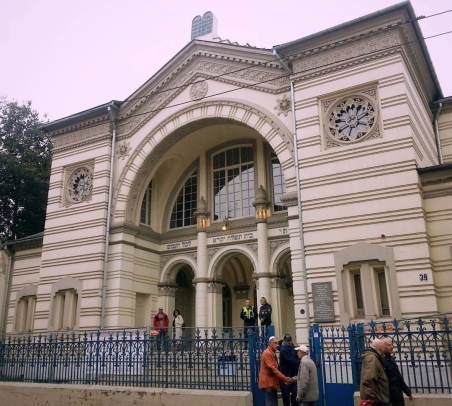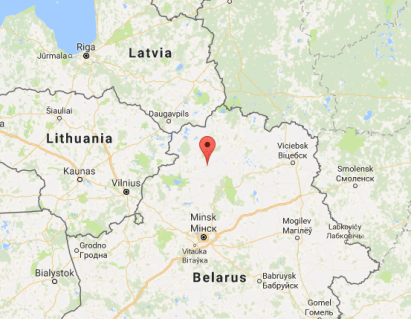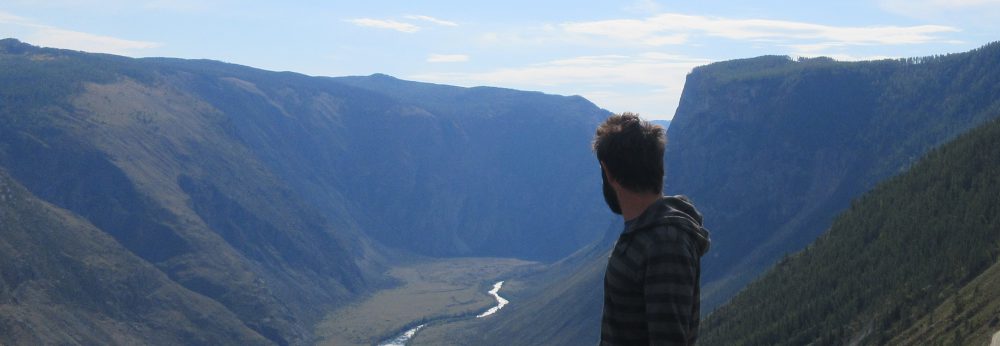I am guided.
By unseen forces.
These are the words that came to me as I sat in a dimly lit, dank, stone arch cellar turned into shul (Yiddish for synagogue) in the heart of the old Jewish quarter in Vilnius, the city once so renowned for being a center of Jewish spiritual study that it was deemed the “Jerusalem of the North.” It was Rosh Hashanah day. I had finally moved on from Ukraine a week before (which wasn’t easy as I had grown to love so much of it and so many people in the many months I was there). I was spending the high holiday in Vilnius while waiting for my visa application to Belarus to be approved so that I could visit the town my great-grandfather Yakov Meytus was from: Glubokoe.
I had resisted coming to this basement cellar shul. “Why did I agree to this?” I kept asking myself. I had been in the Great Choral Synagogue of Vilnius just half an hour before. It was a beautiful synagogue, ornately decorated, the only synagogue (out of dozens) in Vilnius to survive the war and Holocaust. The cantor had an amazing voice and such splendid, joyous energy. A smile so grand creased across his face after every prayer he sang that even his massive, characteristically chassidic, beard couldn’t hide it. The rabbi engaged in sermon with the congregation, giving context to what we were doing, not just recited prayer. There was a good atmosphere in there.

But then he came. A beardless man about my age, who spoke decent English. His tzitzit gave away his piousness. He came to recruit us. I was sitting with another American who I had met during services the evening before. The man explained that his congregation needed two men for minyan (a quorum of ten adult Jewish men) so they could read Torah. He asked if we would join them so that they could have their minyan. I was a little confused at first. We had well beyond minyan here in the synagogue; it was almost full. They were about to begin reading Torah here. Why did he want us to go somewhere else with him? I asked if there was anyone else who could go with him. He said there wasn’t. His eyes were pleading. I didn’t want to leave. I didn’t know him and I didn’t owe him anything. I could have said no. But something greater than my own will was at work.
Against my selfish desire and feelings of resistance, the word “okay” came out of my mouth. My new acquaintance next to me had also agreed. Our recruiter was very pleased. He blessed us with gratitude.
We got out of our seats and exited the synagogue. I wasn’t sure where we were going. The recruiter said our destination wasn’t far. He introduced himself as Gidaliya. I was still trying to make sense of why he needed a minyan elsewhere when we already had one at the synagogue. Then I understood: he’s not Chabad, which the community that was in the synagogue is. He’s something else. He must be Litvak.
Oy, I thought. Litvak services can feel more strict and tedious than Chabad, which for me, as I’m not orthodox, can already feel somewhat strict and tedious. What have I gotten myself into? I thought about apologizing, making an about-face, and heading back to the synagogue. But something inside me wasn’t allowing it. Gidaliya could see my reluctance, my second thoughts. He said to me “Thank you for doing this mitzvah. Don’t worry, you’re in the right place.” Yeah sure, I thought.
We arrived at our destination. It was the Jewish Cultural Information Center and Cafe. Small and plain in comparison with the Great Choral Synagogue. There were a few people standing outside and only a few more inside. Mostly men, but also a couple of women with small children and babies. There was a brief bit of chatting, introductions, and then Gidaliya directed us to head downstairs where the service was to take place. Gidaliya held the door to the basement open for me. He gave another warm, friendly smile and repeated, “You’re in the right place.”
As I descended the stairs and the musty odors of the basement cellar hit my nostrils, I seriously doubted him. I thought I could use the mold as an excuse to leave, to say that I’m sensitive and allergic to it. But something held on to me there, and I entered the small room, normally used for presentations to school groups who come to learn about the Jewish history of Vilnius, now set up as our shul.
I wasn’t sure why I was having such a difficult time saying no. I’ve had struggles with this in the past, doing things against my better judgement out of desire to be nice and to be liked. But through the years, and especially during these travels, I’ve learned to listen to my gut and honor and give voice to my “no.” But in this situation it wasn’t coming out. A part of me was saying “yes.” That part was winning, and I wasn’t sure why.
We went through the service. A Litvak who had flown in from Israel to ring in the New Year in the land of his spiritual ancestors led the service. I found his presence interesting. While thousands of Chassids from around the world were engaging in a now somewhat famous pilgrimage to Uman, around the tomb of their great tzadik, Rebbe Nachman (the founder of the Breslov movement), there was one Litvak who made a pilgrimage to the home of the Litvak’s great tzadik, Rabbi Eliyahu of Vilna (The Vilna Gaon). This Israeli Litvak had an enchanting voice and led some of the most beautifully melodic Torah chanting I’ve ever heard in my life. My mind relaxed as I accepted the place and the moment I was in.
After the Torah service, in a brief pause before musaf (the additional prayer on Shabbat and holidays), Gidaliya struck up conversation with me, inquiring into my story and why I came to Vilnius. I explained that, one, I wanted to experience the Jerusalem of the North, and two, I was applying for a visa to Belarus to visit the town my great-grandfather Yakov Gershovitch Meytus was from. The town use to be part of Lithuania, in the Vilno (as Vilnius was known) Gubernia, but is now within the borders of Belarus.
I further explained that I hadn’t known the name of the town when I began my travels. All we (my family) knew of my great-grandfather’s origins was that he was from somewhere in Lithuania, but at some point he moved to Odessa. When I was in Odessa, I found my grandfather’s (Yakov’s son Gersh) birth certificate. The birth certificate stated which town Gersh’s father, Yakov, came from.
Gidaliya asked which town. I answered: “Glubokoe.”

“I was just there,” he replied. “I was visiting my good friend.”
“You’re kidding!” I exclaimed. I had already spoken of this town with many locals in Vilnius upon answering the question everyone inevitably asks: why had I come to Vilnius. Only occasionally did anyone recognize the town’s name. No one else I had spoken with had been there, let alone knew anyone there.
“His wife is my wife’s sister,” Gidaliya continued. “They’re Jewish.”
“There are still Jews left in Glubokoe?”
“Only a couple: my friend and his wife.”
“Do they know where the old synagogues were? Where the cemetery is or was?”
“Probably. I’ll connect you with them.”
“That would be amazing! Thank you!” I replied with delight and gratitude.
He smiled that warm, bright, friendly smile again. “You see… I told you that you’re in the right place.”
I smiled back at him as my heart opened up to this truth.
I thought that it was he who had recruited me back in the synagogue, but in that moment the dots connected and I understood that it was actually he who had been recruited. He had been recruited to bring me there for the moment we just had. He had been recruited to connect me with the couple of Jews left in my great-grandfather’s hometown who might know something about the old shtetl.
Gidaliya returned to his seat as the congregation began to pray musaf. I sat back in my seat and that smile stretched itself wider across my face. My musaf was a prayer of gratitude to my ancestors for all the mysterious ways they help me and guide me. Gratitude for reminders that they are with me. I laughed at myself for nearly forgetting. It was their hands at my back nudging me forward when I had wanted to turn around.
Several days later, I received my visa and hopped on a bus to Belarus. I sent a message to Anya and Kostya, my new Jewish contacts in Glubokoe, to let them know I was on my way. Gidaliya had sent them prior word about me, and they assured me that they were eagerly awaiting my arrival.


I can’t wait for the continuation. I feel like I am also being carried with you and your ancestors on this journey.
LikeLiked by 1 person
Thank you Amy! Part two will come out soon.
LikeLiked by 1 person
Can’t wait to read the next part!
LikeLiked by 1 person
Please comment here when you post part 2. Thanks.
LikeLike
Hello Cephraim. Part Two is up! https://rootsjourneyblog.wordpress.com/2017/11/23/an-unlikely-meeting-in-my-ancestors-old-shtetl-of-glubokoe-part-two/
LikeLike
I wish I could travel in the area of my Mothers family and discover more . She left Motela in mid 30’s to Palestine leaving family there .
Thank you for your story , joy and goose pimples it gave
LikeLike
Great story! In this article you can find a map of synagogues in Belarus:
http://vaduhan-08.livejournal.com/202088.html
LikeLike
Pingback: An Unlikely Meeting in My Ancestors’ Old Shtetl of Glubokoe – Part Two | Journey to the Lands of the Ancestors